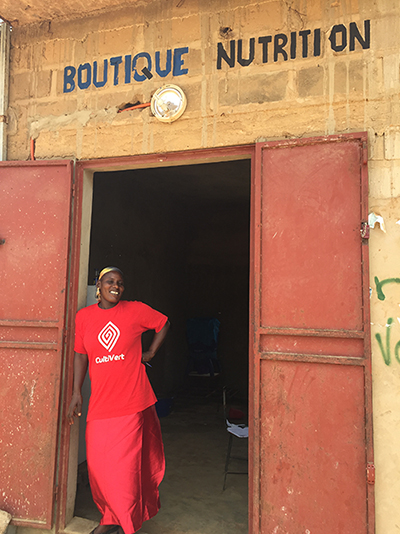Tucked in the corner of Aissata Thilogme’s small store is her best-selling product—clean water. Not bottles, but bags and bags of filtered water for a fraction of the cost.
The store, a small room in a larger cement block building off the only main road through town, is nondescript except for the sign above the door—Nutrition Boutique. Inside sits a refrigerator, small table with bags of flour and a large LifeStraw Filter.
Aissata is a community based solution provider (CBSP) in the Matam Region of Senegal. Nominated by her community as part of NCBA CLUSA’s USAID|Yaajeende project, she is a local entrepreneur who provides access to essential items like seeds, enriched flour and clean water.
Before the community nominated Aissata as a CBSP, she was working as a nutrition volunteer, training mother’s groups on nutrition for themselves and their children. Continuing her training, now she can provide her mother’s groups access to healthy and nutritious products, making the training real and useful.
The USAID|Yaajeende project ran the Celludam clean water public health campaign a few years ago. Information on the basics of cleaning water and the importance of clean water—especially for children—was disseminated through radio programs, local village fairs and the curriculums of Debbo Galle mother-to-mother groups. As one of the trainers for her local Debbo Galle group, Aissata saw an opportunity to help the mothers of her group access clean water.
“The Celludam campaign told people to drink clean water. It was important because now diarrhea is decreasing,” Aissata said. She could see the effect right in her village. With clean water, families were healthier, children missed less school. But bottled water—the only clean water in her village—was too expensive for many families.
Through Yaajeende, she was able to procure a large LifeStraw water filter for her store. She would filter gallons of water each day into plastic bags, tie off the tops and freeze or cool them in her fridge, selling the clean water at a fraction of the cost of bottled water from other shops.
[Aissata stands at the entrance to her “Nutrition Boutique.”] It quickly became her most popular product.
“The community knows what I’m doing is important,” Aissata said.
She explained there were two types of customers in her village. The first type buys the filtered water; others, for whom even filtered water is too much of a financial burden, buy bleach, which Aissata also sells in her store. She teaches mothers in the second group how to purify their own water at home, using a safe ratio of bleach to water.
It was clear that families, no matter their income level, understood the importance of clean water. By providing access to cheaper filtered water and other non-bottled options through her store, Aissata was filling a need through entrepreneurship, a sustainable way to continue to take care of the filter and bring in more products to her remote village.
Adding value to these products, Aissata clearly has a brain for business. Seeing a need, she also developed enriched flour and cookies, providing nutrition for small children.
“The most important part of the business for me, apart from the LifeStraw, is the transformation of foods when I make flour and cookies,” Aissata said. Mothers were coming in to buy the enriched flour, knowing it was more nutritious for their children. Before, they would have to travel to a larger town to access nutrient-dense cooking staples.
Aissata’s success over the past few years has grown her business. Identifying high-achieving CBSPs like Aissata, the USAID|Yaajeende project wanted to help standardize and market the healthy products across Senegal through a new brand—Cultivert. Aissata recently attended a Cultivert training to decide if she wants to invest in the model and expand her reach.
“Now everyone has access. Instead of importing from America things like seeds, or enriched flour, we can get them right here,” Aissata said. “We know how to not waste the product, we can make it into other foods like flour and use it for other products making it last longer. Now a bad harvest isn’t so risky.”
CBSP entrepreneurs like Aissata have brought agriculture, nutrition and clean water products to their villages in Senegal. With training and support from USAID| Yaajeende, over 300 such entrepreneurs have linked up with 27 high-quality firms to get more than $2.6 million in products to the remotest areas.
Learn more about the USAID|Yaajeende project and the Cultivert and CBSP model.



